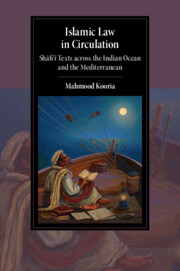‘Mahmood Kooria’s examination of how Shafi’i legal texts travelled across time and space, creating intellectual communities and linkages, represents a new and exciting methodological direction for Islamic legal studies. A tradition of interconnected scholarship stretching out over centuries is expertly mapped out, introducing the field to new and unexplored contexts. Kooria’s detailed research feeds into a wider portrayal of the remarkable diversity, longevity and vitality of the Shafi’i school in the late premodern period, happening in scholarly contexts beyond the traditional centres. Through his meticulous new work, our vistas of Islamic legal history are broadened - the book will be read, and re-read, heralding a new and exciting focus for future research.’
Robert Gleave - University of Exeter
‘This is the definitive account of how one school of Islamic law came to dominate the Indian Ocean rim, not through state conquest or sponsorship, but via cross-cultural negotiations among mobile scholars and merchants from Africa, Arabia and Asia. This landmark study of transregional texts and contexts is an indispensable guide to the shared educational syllabi and religious resonances one encounters from Mombasa to Mindanao. A remarkable achievement.’
Engseng Ho - Duke University
‘With expansive breadth and fine-grained analysis, Mahmood Kooria takes on one of the most enduring narratives in world history, on the place of Islamic law in maritime Asia. This book rewrites the history of the early modern Indian Ocean and forces us to rethink much of what we know of the legal history of the Islamic world. It will be read, debated, and cited for many years to come.’
Fahad Ahmad Bishara - University of Virginia
‘This book on the Shāfiʿī legal school and its followers along the Indian Ocean rim is a much needed intervention in the study of Islamic law. It sidesteps the traditional focus on the Middle East, placing circulating Arabic jurisprudential texts in diverse social and linguistic contexts. A real tour de force.’
Nandini Chatterjee - University of Exeter
‘With expansive breadth and fine-grained analysis, Kooria takes on one of the most enduring narratives in world history, on the place of Islamic law in maritime Asia. This book rewrites the history of the early modern Indian Ocean, and forces us to rethink much of what we know of the legal history of the Islamic world. It will be read, debated and cited for many years to come.’
Fahad Ahmad Bishara - University of Virginia
‘This book on the Shāfiʿī legal school and its followers along the Indian Ocean rim is a much-needed intervention in the study of Islamic law. It sidesteps the traditional focus on the Middle East, placing circulating Arabic jurisprudential texts in diverse social and linguistic contexts. A real tour de force.’
Nandini Chatterjee - University of Exeter
‘Mahmood Kooria’s examination of how Shāfiʿī legal texts travelled across time and space, creating intellectual communities and linkages, represents a new and exciting methodological direction for Islamic legal studies. A tradition of interconnected scholarship stretching out over centuries is expertly mapped out, introducing the field to new and unexplored contexts. Kooria’s detailed research feeds into a wider portrayal of the remarkable diversity, longevity and vitality of the Shāfiʿī school in the late premodern period, happening in scholarly contexts beyond the traditional centres. Through his meticulous new work, our vistas of Islamic legal history are broadened – the book will be read, and re-read, heralding a new and exciting focus for future research.’
Robert Gleaves - University of Exeter
‘Mahmood Kooria's Islamic Law in Circulation is the definitive account of how one school of Islamic law came to dominate the Indian Ocean rim, not through state conquest or sponsorship, but via cross-cultural negotiations among mobile scholars and merchants from Africa, Arabia and Asia. This landmark study of transregional texts and contexts is an indispensable guide to the shared educational syllabi and religious resonances one encounters from Mombasa to Mindanao. A remarkable achievement.’
Engseng Ho - Duke University
‘… a wonderful and important book that should be read not only by scholars of Islam, but by anyone interested in Indian Ocean studies and in the methodology of global legal and intellectual history.’
Torsten Tschacher
Source: International Quarterly for Asian Studies



